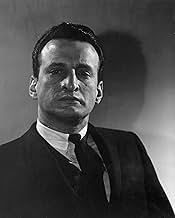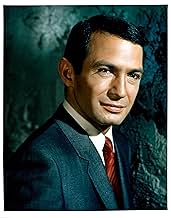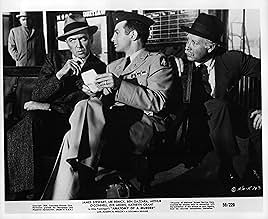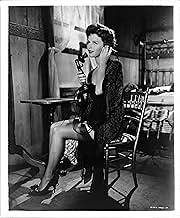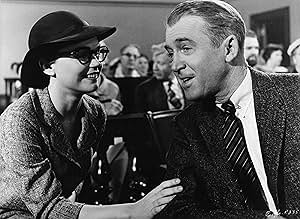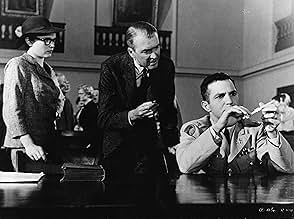An upstate Michigan lawyer defends a soldier who claims he killed an innkeeper due to temporary insanity after the victim raped his wife. What is the truth and will he win his case?An upstate Michigan lawyer defends a soldier who claims he killed an innkeeper due to temporary insanity after the victim raped his wife. What is the truth and will he win his case?An upstate Michigan lawyer defends a soldier who claims he killed an innkeeper due to temporary insanity after the victim raped his wife. What is the truth and will he win his case?
- Nominated for 7 Oscars
- 10 wins & 18 nominations total
- Director
- Writers
- All cast & crew
- Production, box office & more at IMDbPro
Featured reviews
If you haven't yet seen Anatomy of a Murder, you've got to buy a copy and host a movie night as soon as you can. You're going to want to own your own copy, since this exciting courtroom drama can be enjoyed over and over again. I've lost track of how many times I've seen it, and it never gets old. I'm a huge fan of the boundary-pushing director Otto Preminger, and he once again pushed the envelope of the censors in 1959. In this movie, the words "rape" and "panties" are spoken several times - shocking at that time!
James Stewart, in his silver-haired charm, stars as a defense attorney with passions outside the courtroom. He loves fishing, he loves jazz music, and he loves the sight of a good-looking woman. When the latter appears in his office, in the form of Lee Remick, asking for his help in her husband's upcoming trial, he agrees to take the case. Lee is beautiful and sexy, and she brings out such a flirtatious spark in Jimmy. Her husband, Ben Gazarra, will be on trial for murdering the man who raped and beat her up. It seems like an easy case, right? Not exactly.
There's much more to the situation than meets the eye. As Jimmy explains to Ben on their first, memorable meeting: "There are four ways I can defend murder. . ." I love that scene. It's clever and concise without seeming glib or artificial. The chemistry between every member of the cast is so electric, you can feel the words bouncing off the actors. Jimmy and Ben spar with their eyes, George C. Scott and Jimmy love to hate each other, and George practically undresses Lee with his words. Who knew a murder trial could have so much sex appeal?
The script is intelligent, the performances are energetic, and the subject matter is modern for its time. There are so many reasons to watch it, and so many things to appreciate when you do watch it, that you'll keep coming back to it over the years as I have.
James Stewart, in his silver-haired charm, stars as a defense attorney with passions outside the courtroom. He loves fishing, he loves jazz music, and he loves the sight of a good-looking woman. When the latter appears in his office, in the form of Lee Remick, asking for his help in her husband's upcoming trial, he agrees to take the case. Lee is beautiful and sexy, and she brings out such a flirtatious spark in Jimmy. Her husband, Ben Gazarra, will be on trial for murdering the man who raped and beat her up. It seems like an easy case, right? Not exactly.
There's much more to the situation than meets the eye. As Jimmy explains to Ben on their first, memorable meeting: "There are four ways I can defend murder. . ." I love that scene. It's clever and concise without seeming glib or artificial. The chemistry between every member of the cast is so electric, you can feel the words bouncing off the actors. Jimmy and Ben spar with their eyes, George C. Scott and Jimmy love to hate each other, and George practically undresses Lee with his words. Who knew a murder trial could have so much sex appeal?
The script is intelligent, the performances are energetic, and the subject matter is modern for its time. There are so many reasons to watch it, and so many things to appreciate when you do watch it, that you'll keep coming back to it over the years as I have.
Based on the famous Traver novel, ANATOMY OF A MURDER is an extremely complex film that defeats easy definition. In some respects it is a social document of the era in which it was made; primarily, however, it is a detailed portrait of the law at work and the mechanizations and motivations of the individuals involved in a seemingly straight-forward case. In the process it raises certain ethical issues re attorney behavior and the lengths to which an attorney might go to win a case.
Paul Biegler (James Stewart) is a small-town lawyer who has recently lost a re-election for the position of District Attorney and who is down on his luck--when a headline-making case involving assault, alleged rape, and murder drops into his lap. As the case evolves, there is no question about the identity of the killer. But a smart lawyer might be able to get him off just the same and redeem his own career in the process, and with the aid of an old friend (Arthur O'Connell) and his formidable secretary (Eve Arden), Biegler sets out to do precisely that. Opposing him in the courtroom is Claude Dancer (George C. Scott), a high powered prosecutor who is equally determined to get a conviction... and who is no more adverse to coaching a witness than Biegler himself. The two square off in a constantly shifting battle for the jury, a battle that often consists of underhanded tactics on both sides.
The performances are impressive, with James Stewart ideally cast as the attorney for the defense, Ben Gazzara as his unsavory client, and a truly brilliant Lee Remick as the sexy and disreputable wife who screams rape where just possibly none occurred; O'Connell, Arden, and Scott also offer superior performances. The script is sharp, cool, and meticulous, the direction and cinematography both effective and completely unobtrusive, and the famous jazz score adds quite a bit to the film as a whole.
Although we can't help rooting for Stewart, as the film progresses it seems more and more likely that Remick is lying through her teeth and Gazzara is as guilty as sin--but the film balances its elements in such a way as to achieve a disturbing ambiguity that continues right through to the end. If you expect a courtroom thriller with sudden revelations and twists you'll likely be disappointed in ANATOMY OF A MURDER, but if you want a thought-provoking take on the law you'd be hard pressed to find one better. Recommended.
Gary F. Taylor, aka GFT, Amazon Reviewer
Paul Biegler (James Stewart) is a small-town lawyer who has recently lost a re-election for the position of District Attorney and who is down on his luck--when a headline-making case involving assault, alleged rape, and murder drops into his lap. As the case evolves, there is no question about the identity of the killer. But a smart lawyer might be able to get him off just the same and redeem his own career in the process, and with the aid of an old friend (Arthur O'Connell) and his formidable secretary (Eve Arden), Biegler sets out to do precisely that. Opposing him in the courtroom is Claude Dancer (George C. Scott), a high powered prosecutor who is equally determined to get a conviction... and who is no more adverse to coaching a witness than Biegler himself. The two square off in a constantly shifting battle for the jury, a battle that often consists of underhanded tactics on both sides.
The performances are impressive, with James Stewart ideally cast as the attorney for the defense, Ben Gazzara as his unsavory client, and a truly brilliant Lee Remick as the sexy and disreputable wife who screams rape where just possibly none occurred; O'Connell, Arden, and Scott also offer superior performances. The script is sharp, cool, and meticulous, the direction and cinematography both effective and completely unobtrusive, and the famous jazz score adds quite a bit to the film as a whole.
Although we can't help rooting for Stewart, as the film progresses it seems more and more likely that Remick is lying through her teeth and Gazzara is as guilty as sin--but the film balances its elements in such a way as to achieve a disturbing ambiguity that continues right through to the end. If you expect a courtroom thriller with sudden revelations and twists you'll likely be disappointed in ANATOMY OF A MURDER, but if you want a thought-provoking take on the law you'd be hard pressed to find one better. Recommended.
Gary F. Taylor, aka GFT, Amazon Reviewer
Well filmed, beautifully acted, and painstakingly directed, this film deserves the highest praise.
James Stewart brings his customary stammering, quirky charm to a role that could have easily become overwhelmingly serious. Lee Remick is seen establishing her early image as the somehow fragile, undeniably seductive pawn (see also "A Face in The Crowd"), while Gazzara wavers intensely somewhere between heartless murderer and protective husband. The supporting cast is strong, creating a human backdrop for the senior players, keeping the story in the real world, effectively preventing this from becoming an exercise in legal theory.
This film is noteworthy for a myriad of reasons, but most specifically because it addresses the still controversial issue of acquaintance rape, and presents us with a victim of questionable morals. At the same time our murder victim is seen as a monster, then a friend and father. There really are no heroes here, no noble defenders, no pristine heroines, no completely innocent bystanders...both sides take their turns pointing fingers, each claiming that the other only got what they deserved.
We are forced to re-evaluate our thoughts on what constitutes justifiable homicide--the unwritten law that Manion speaks of in the film versus the law as written that Biegler must now interpret. This manipulation of intended meaning sets a somewhat tragic precedent evident in the legal system we work within today.
This film is highly entertaining, and excellent for discussion. Watch it with some of your more philosophical friends.
James Stewart brings his customary stammering, quirky charm to a role that could have easily become overwhelmingly serious. Lee Remick is seen establishing her early image as the somehow fragile, undeniably seductive pawn (see also "A Face in The Crowd"), while Gazzara wavers intensely somewhere between heartless murderer and protective husband. The supporting cast is strong, creating a human backdrop for the senior players, keeping the story in the real world, effectively preventing this from becoming an exercise in legal theory.
This film is noteworthy for a myriad of reasons, but most specifically because it addresses the still controversial issue of acquaintance rape, and presents us with a victim of questionable morals. At the same time our murder victim is seen as a monster, then a friend and father. There really are no heroes here, no noble defenders, no pristine heroines, no completely innocent bystanders...both sides take their turns pointing fingers, each claiming that the other only got what they deserved.
We are forced to re-evaluate our thoughts on what constitutes justifiable homicide--the unwritten law that Manion speaks of in the film versus the law as written that Biegler must now interpret. This manipulation of intended meaning sets a somewhat tragic precedent evident in the legal system we work within today.
This film is highly entertaining, and excellent for discussion. Watch it with some of your more philosophical friends.
The legendary James Stewart has worked for several of Hollywood's most legendary directors including Frank Capra and Alfred Hitchcock but his films for them can not reach the level of this 1959 Columbia Pictures release that he did for Otto Preminger. Stewart gives his all time greatest performance in a gem of a courtroom drama that is often overlooked. Released on the heels of several other courtroom drama classics such as "Twelve Angry Men" and "Witness For The Prosecution", "Anatomy Of A Murder" tells the story of a small town Michigan lawyer (Stewart) who takes on the case of an army officer who is standing trial for murdering a man who he believes had raped his wife. A little risque and controversial for its time but still a classic and time has served it well. A triumph for all of the talent involved.
As a courtroom drama, "Anatomy of a Murder" would be hard to surpass. It is a first-class production with an interesting and unpredictable story plus a strong cast. It works admirably, both as a story and as a portrayal of the workings of the law. It avoids the labored dramatics and contrived resolutions in which so many movies of the genre indulge, and it also declines to shy away from pointing out the more ill-conceived features of the legal system.
From his first scene, James Stewart pulls the viewer right into the world of lawyer Paul Biegler. It takes little time before you come to know him and to get a pretty good idea of what his life is like. His scenes with Arthur O'Connell work well in rounding out the picture. The two are neither heroic nor brilliant, but simply sympathetic and believable.
Into Biegler's world then come the characters played by Ben Gazzara and Lee Remick, a married couple with more than their share of faults. By making them less than ideal clients, the movie takes a chance on losing the audience's sympathy, but it adds credibility and complexity to the story. Both roles are played well - again, it seems as if you know a lot more about them than is specifically stated.
When George C. Scott enters the picture, he adds yet another dimension. His character arrives at just the right time to complicate the plot, and his legal skirmishing with Stewart makes some dry material come to life in an interesting way. Eve Arden also has some good moments, and her character is used in just the right amount to add some amusement without causing a distraction from the main story. It's also interesting to see Joseph Welch as the judge, and his portrayal works well enough.
Otto Preminger holds everything together nicely, with the right amount of detail and a pace that keeps the story moving steadily. The result is a very nice contrast to the many run-of-the mill legal/courtroom movies that present such an idealized view of the justice system. It maintains a careful balance, making clear the flaws and unpleasant realities of the system, yet never taking cheap shots either. And it's also an interesting and involved story, one of the most carefully-crafted of its kind.
From his first scene, James Stewart pulls the viewer right into the world of lawyer Paul Biegler. It takes little time before you come to know him and to get a pretty good idea of what his life is like. His scenes with Arthur O'Connell work well in rounding out the picture. The two are neither heroic nor brilliant, but simply sympathetic and believable.
Into Biegler's world then come the characters played by Ben Gazzara and Lee Remick, a married couple with more than their share of faults. By making them less than ideal clients, the movie takes a chance on losing the audience's sympathy, but it adds credibility and complexity to the story. Both roles are played well - again, it seems as if you know a lot more about them than is specifically stated.
When George C. Scott enters the picture, he adds yet another dimension. His character arrives at just the right time to complicate the plot, and his legal skirmishing with Stewart makes some dry material come to life in an interesting way. Eve Arden also has some good moments, and her character is used in just the right amount to add some amusement without causing a distraction from the main story. It's also interesting to see Joseph Welch as the judge, and his portrayal works well enough.
Otto Preminger holds everything together nicely, with the right amount of detail and a pace that keeps the story moving steadily. The result is a very nice contrast to the many run-of-the mill legal/courtroom movies that present such an idealized view of the justice system. It maintains a careful balance, making clear the flaws and unpleasant realities of the system, yet never taking cheap shots either. And it's also an interesting and involved story, one of the most carefully-crafted of its kind.
Did you know
- TriviaPart of the controversy surrounding this movie was because it included use of the words "bitch", "contraceptive", "panties", "penetration", "rape", "slut", and "sperm".
- GoofsWhen Biegler returns to his house at the start of the film, McCarthy points to the United States Supreme Court reports and asks if they should read "a little Chief Justice Holmes", and Biegler also refers to "Chief Justice Holmes". Oliver Wendell Holmes was an Associate Justice of the U.S. Supreme Court, never Chief Justice. (He was, however, Chief Justice of the Supreme Judicial Court of Massachusetts before being appointed to the U.S. Supreme Court.)
- Quotes
Paul Biegler: As a lawyer, I've had to learn that people aren't just good or just bad. People are many things.
- ConnectionsFeatured in Portrait of an Actor (1971)
Details
- Release date
- Country of origin
- Language
- Also known as
- Anatomía de un asesinato
- Filming locations
- Tripoli Bar, Ishpeming, Michigan, USA(interiors: Thunder Bay Inn)
- Production company
- See more company credits at IMDbPro
Box office
- Gross worldwide
- $194
- Runtime
- 2h 41m(161 min)
- Color
- Sound mix
- Aspect ratio
- 1.85 : 1
Contribute to this page
Suggest an edit or add missing content



